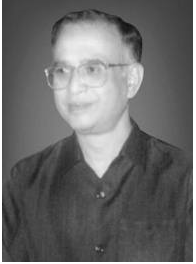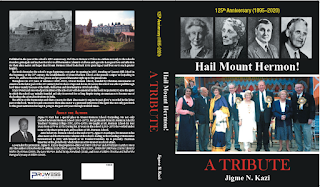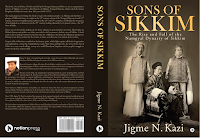Remembering Nari Rustomji
“I feel at home with the tribals”
May 16 was Meghalaya’s first chief
secretary Nari K Rustomji’s birth anniversary. Glenn C Kharkongor recalls his
contribution to the Northeast
NARI K Rustomji studied classical Latin and Greek, was
secretary of the Musical Society and played the piano and violin at Cambridge
University. Such a background would be considered unusual for a bureaucrat
today. Perhaps it was these sensibilities that made Rustomji one of the most
endearing political administrators of his era and his affection for the tribals
of Northeast India is legendary.
This week
is the 94th birth anniversary of the first chief secretary of Meghalaya, who
died a decade ago.
The Northeast has all but forgotten this remarkable bureaucrat, whose grasp of geopolitical matters and understanding of tribal cultures made him one of the most sympathetic and understanding administrators of the Northeast in the transition to and in the early post-Independence era. He and Verrier Elwin were often described as romantics. They were close friends and Rustomji in fact, edited a volume of Elwin’s selected writings. Their advice was relied upon greatly by Nehru and resulted in a policy for the Northeast that has been described as Nehruvian humanistic paternalism. Sadly, that benevolent policy has lapsed and has been replaced with a chaotic and befuddled mindset in Delhi, which results in cultural aggression and headlong underdevelopment, characterized by insensitivity and greed.
Rustomji
was influenced greatly by Plato and Socrates, and intended to become a school
teacher, but was persuaded by his teachers to apply for the ICS. It was during
World War II, and at the interview he was asked about his contribution to the
war effort. At the time he was a member of the Royal Observer Corps, keeping a
tally of enemy planes that flew overhead. When he mentioned that he was a plane
spotter, the examiners inquired how many planes he had spotted the previous
week. His reply was a solemn “I’m sorry sir, that’s top secret”. There was an
amused murmur of approval among the greybeards and he felt that he had clinched
the appointment.
At the end
of his ICS probationary training in Dehra Dun, Nari K Rustomji was assigned to
Assam, which he accepted whole-heartedly.
One of the main reasons for this enthusiasm was Assam’s proximity to
Sikkim and Bhutan. He had been introduced to these countries, India’s
neighbours in the Northeast, by his friendship with the crown prince of Sikkim,
Thondup Namgyal and his cousin, the prince of Bhutan, Jigme Dorji who were
probationers along with him in 1942. These lifelong friendships were cemented
during Rustomji’s posting as Dewan of Sikkim from 1954-59 and when he was
appointed as Adviser to the Government of Bhutan in 1963.
Rustomji
spent most of his career in the Northeast, spanning from his first appointment
as district publicity organiser in Sylhet during the Second World War, a kind
of propaganda post to develop and deliver positive messages to the public in
favour of the Allies, to being the first chief secretary of Meghalaya in 1972.
In between he served in various administrative posts in Maulvibazar, Lakhimpur
and Dibrugarh. Perhaps the most noteworthy position that he had was adviser to
the Governor of Assam on tribal affairs, during which time he exerted
considerable influence on the formulation of policies for the hill areas.
He was
associated with the implementation of the early seven-year plans in Sikkim and
Bhutan. Significant in these development
efforts were a visionary intent to protect the environment and biodiversity of
the region and to protect the region from unwanted kinds of development. He was
also careful to ensure that cultural traditions and sensitivities were
protected in implementing the Plans.
Rustomji
was deeply drawn to the tribals of the region. In his book Enchanted
Frontiers, Rustomji says, “The people of the hills have had for me a
special pull. I feel utterly and completely at home with my (tribal) hosts. I
am at heart, very much a tribal myself. I share much of the bewilderment and
loss of identity of the tribal of today”. He learned the local language at
every posting and even wore indigenous costumes to work. Much of his scholarly
writing are on the anthropology and sociology of the tribes and these articles
have appeared in journals such as Himalayan Environment and Culture brought out
by the Indian Institute of Advanced Study.
As Dewan of
the Chogyal of Sikkim and adviser to the Government of Bhutan, he immersed
himself in the cultural milieu of those countries, learning the Sikkimese and
Bhutanese languages and wearing the local costumes. He would wear the Sikkimese
gown, the ko, even during his trips to Delhi. This led the foreign secretary to
comment wryly that while the Dewan might wear Sikkimese dress in Gangtok, he
failed to see the point of his wearing the gown in Delhi.
During the
governorship of Sri Prakasa, he played a pivotal role in obtaining the
accession to India of the maharajas of Manipur, Cooch Behar and Manipur. Though
varying amounts of duress were exerted in these efforts, Rustomji came out each
time with the respect of the maharaja.
On each occasion his services were requested as the first Chief
Commissioner of the accessed kingdom.
He had a
part in the negotiations with the Naga and Mizo tribals. He tried to convince
the Government that “right principles, rather than force of arms” was the right
policy. He spoke out against the tendency of officers to pontificate
patronizingly about “uplifting our tribal brethren”. Himself a Zoroastrian, he tried to convince
the tribals that they were free to practice the religion of their choice, by
arranging special broadcasts of Christian services on Sundays in English and in
the various Naga languages. He describes his poignant interaction with a Naga
prisoner, discussing letters that the prisoner had written about a cat who was
his sole companion in jail. He discussed
with General Shrinagesh about a sympathetic approach to the hearts and minds of
the tribal people. Sadly, they were not many in the political and military
establishment that shared his statesmanlike approach.
In 1951,
when he was stationed in Shillong as advisor to the Governor of Assam, Rustomji
got married to Hilla Master, daughter of Jal Ardeshir Master, chief conservator
of forests, Madras Presidency. They had met in Bombay the previous year; he was
31 and she was 23. Their daughter Tusna was born at Welsh Mission Hospital in
1952. Sadly, Hilla died of complications soon after. He married again in 1963
to Avi Dalal, someone the family had long known.
An
unfortunate outcome of Partition was the closure of trade between the Khasi
Hills and the contiguous areas of East Pakistan. Perishable oranges and betel
nut from the border plantations now had no outlet market and Rustomji approved
the request of the local traders for an airstrip in Shella, so that the produce
could be flown to Calcutta. Regrettably, this never happened.
As chief
secretary in the new state of Meghalaya, he determined to set up an efficient
administration, leading by example. Each morning he walked from his residence,
Lumpyngad, followed by a clerk, who dutifully took down notes on the way to the
Secretariat. He once visited a district headquarters unannounced and found the
deputy commissioner absent from his office. Rustomji sent for the absentee
officer, who on hearing that the chief secretary was around immediately
declared himself sick. Rustomji then sat in the DC’s chair and spent the day
disposing of pending files.
If you
Google his name and browse the internet, only snippets about Rustomji appear,
brief lines in a scholarly article or a blog. Most of what is available are
accounts in the five books he has written. In these idealistic, analytical and
balanced accounts, he carefully blends the history, culture and politics of
this complex region as a background for governance and administration.
Surely the
man deserves weightier evidence of his contribution to the Northeast. Indeed such an analysis would provide clues
to achieving better solutions to the continuing myriad problems of the
Northeast, many of which can be traced to the post-Independence era in which
misguided and heavy-handed policies were framed. The politicians and mandarins of today seem
to continue in the same vein. They should study Rustomji’s books.
(Ref: Shillong Times in 2013, and Parsi Khabar,
June 1, 2016.)








.jpg)
.jpg)
.jpg)




